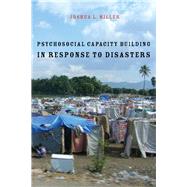Psychosocial Capacity Building in Response to Disasters
, by Miller, Joshua L.- ISBN: 9780231148207 | 0231148208
- Cover: Hardcover
- Copyright: 1/20/2012
Disaster responders treat more than just the immediate emotional and psychological trauma of victims: they empower individuals and families to heal themselves long into a disaster's aftermath. This requires rebuilding the ability of survivors to meet their emotional and psychological needs, not only for themselves but also for others, and necessitates a careful consideration of survivors' social, economic, and political realities so healing and recovery can outlast the reverberations of disaster. This comprehensive book integrates Western mental health approaches and international models of psychosocial capacity building within a social ecology framework, providing practitioners and volunteers with a blueprint for individual, family, group, and community interventions. Joshua Miller focuses on a range of disasters, both large and small, involving natural, technological, and other complex factors at local, regional, national, and international levels. Case studies from throughout the world explore the social, psychological, economic, political, and cultural issues affecting various reactions to disaster, such as how an individual, family, or community may interpret its meaning, and illustrate the importance of drawing on local cultural practices to promote empowerment and resiliency. Miller encourages developing people's capacity to direct their own recovery, using a social ecology framework to conceptualize disasters and their consequences. He also explains how to identify sources of vulnerability and support individual, family, and community resiliency; adapt and implement traditional disaster mental health interventions in different contexts; use groups and activities to facilitate recovery as part of a larger strategy of psychosocial capacity building; and foster collective grieving and memorializing. Geared toward modern audiences, Miller's text examines the unique dynamics of intergroup conflict and the relationship between psychosocial healing, social justice, and peace and reconciliation. Each chapter ends with a mindfulness exercise and recommendations for practitioner self-care.






